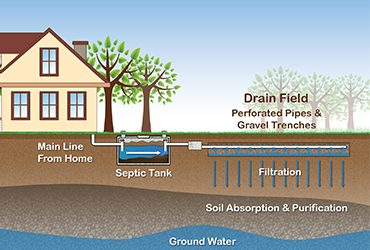How Does a Septic System Work?
For homeowners not connected to a municipal sewer system, a septic system plays a crucial role in wastewater management. Understanding how does a septic system work can help you maintain it properly, avoid costly repairs, and ensure its longevity. This article provides a detailed look at how septic systems work, covering their main components, how they treat wastewater, and what you need to know to keep your system functioning efficiently.
What Is a Septic System?
Before diving into the mechanics of how do septic systems work, it’s important to define what a septic system is. A septic system is an underground wastewater treatment structure commonly used in rural or suburban homes. Unlike a city sewer system that transports waste to a centralized facility for treatment, a septic system treats wastewater on-site.
The system is designed to separate solids from liquids, treat the wastewater, and safely dispose of it back into the ground. A typical septic system has two main components: the septic tank and the drain field (also called a leach field). Both work together to process household wastewater safely and efficiently.
How Does a Septic System Work?
Now that we have an overview, let’s explore how does a septic system work by examining each stage of the process. From the moment wastewater leaves your home to the time it returns to the environment, each step ensures proper treatment and disposal.
1. Wastewater Enters the Septic Tank
The first step in the process occurs when water from your home’s sinks, toilets, showers, and appliances flows into the septic tank. This large, watertight container is typically made of concrete, fiberglass, or plastic and is buried underground near the home. The purpose of the tank is to hold the wastewater long enough for solids to settle and liquids to rise.
Inside the septic tank, the wastewater separates into three distinct layers:
- Sludge: This is the solid waste that sinks to the bottom of the tank. It consists of heavier materials like human waste, food particles, and other solids.
- Scum: Oils, fats, and grease float to the top of the tank, forming a layer called scum.
- Effluent: The middle layer consists of liquid waste, called effluent, which is the water that will be further treated in the drain field.
The septic tank’s job is to allow solids and liquids to separate, while bacteria inside the tank begin breaking down the organic matter. Over time, the sludge and scum accumulate and must be pumped out periodically to prevent them from overflowing into the drain field.
2. Effluent Flows to the Drain Field
Once the solids settle, the liquid effluent leaves the septic tank and travels through an outlet pipe to the drain field (or leach field). This is where the wastewater undergoes further treatment.
The drain field is made up of perforated pipes buried in trenches filled with gravel or sand. These pipes distribute the effluent evenly over a large area, allowing it to seep into the surrounding soil. The soil and gravel act as natural filters, helping to remove any remaining contaminants.
3. Soil Filtration and Absorption
The most critical stage of how septic systems work takes place in the soil surrounding the drain field. As the effluent slowly filters through the gravel and soil layers, it undergoes natural biological treatment. Microorganisms in the soil break down harmful pathogens and bacteria, further purifying the wastewater before it reaches the groundwater.
Proper soil conditions are essential for this process to work effectively. If the soil is too dense or poorly drained (like clay), the system may struggle to absorb the effluent, leading to backups or pooling water on the surface.
4. Clean Water Returns to the Groundwater
The final step in how does a septic system work is when the treated effluent returns to the groundwater. By this point, the water has been thoroughly filtered and is safe to reenter the environment. This natural process ensures that the wastewater from your home is treated properly and doesn’t contaminate nearby water sources.
Why Is a Septic System Important?
Understanding how do septic systems work underscores their importance. Septic systems not only handle your household wastewater but also protect public health and the environment by treating waste on-site. Here are some key reasons why a septic system is essential:
1. Protecting the Environment
A properly functioning septic system ensures that wastewater is treated before it reaches the groundwater, rivers, lakes, or streams. Without this filtration process, untreated sewage could seep into the soil and contaminate local water sources. Septic systems play a critical role in preventing water pollution, especially in rural areas where homes may be close to natural bodies of water.
2. Preventing Health Hazards
Untreated wastewater contains harmful bacteria, viruses, and other pathogens that can pose serious health risks to humans and animals. By treating wastewater before it reenters the environment, septic systems prevent these contaminants from spreading and causing illnesses.
3. Cost-Effective Waste Management
For homes located in areas without municipal sewer systems, septic systems provide a cost-effective solution to managing wastewater. While septic systems require regular maintenance and occasional pumping, they are far less expensive than installing extensive sewer infrastructure.
Signs of Septic System Problems
Even though septic systems are designed to last for many years, problems can arise if they are not properly maintained. Recognizing the signs of a septic system issue early on can help prevent major repairs. Here are some common warning signs that your septic system may need attention:
1. Slow Drains
If sinks, toilets, or bathtubs are draining more slowly than usual, it could be a sign that your septic tank is full or that the system is experiencing a clog. Slow drains are often one of the first signs of a problem with your septic system.
2. Foul Odors
A strong sewage smell near the septic tank or in your yard can indicate that the system is not treating wastewater properly. This could mean that the tank is full, that there’s a blockage in the pipes, or that the drain field is failing.
3. Pooling Water
Water pooling near the drain field, especially in dry weather, is a clear sign that the soil is not absorbing the wastewater properly. This could indicate that the drain field is overloaded or that the soil has become compacted or saturated.
4. Lush, Green Grass Over the Drain Field
While healthy grass is generally a good sign, unusually lush or fast-growing grass over the drain field may signal that untreated wastewater is leaking into the soil. This is often caused by an overloaded system or failing drain field pipes.
How to Maintain Your Septic System
Now that you understand how does a septic system work, it’s essential to maintain it properly to ensure long-term functionality. Here are a few tips for keeping your septic system in good condition:
1. Regular Pumping
One of the most important maintenance tasks for a septic system is regular pumping. Most septic tanks should be pumped every 3-5 years, depending on the size of the tank and household water usage. Pumping the tank removes the accumulated sludge and scum, preventing them from overflowing into the drain field.
2. Conserve Water
Excessive water use can overload your septic system, causing the drain field to become saturated. To prevent this, consider conserving water by fixing leaks, installing water-efficient appliances, and spacing out heavy water-using activities like laundry and dishwashing.
3. Avoid Flushing Harmful Items
Only biodegradable waste should be flushed or sent down drains. Non-biodegradable items like paper towels, wipes, diapers, or feminine hygiene products can clog your system. Similarly, avoid pouring chemicals, oils, or grease down the drain, as they can damage your septic system’s bacteria.
4. Protect the Drain Field
The drain field is a delicate area of the system. Avoid driving or parking vehicles over it, as heavy traffic can compact the soil and damage the pipes. Additionally, keep trees and large shrubs away from the drain field to prevent root intrusion, which can cause blockages.
Conclusion
Understanding how does a septic system work provides valuable insight into how your home’s wastewater is treated and disposed of. From the septic tank, where solids and liquids separate, to the drain field, where natural filtration occurs, each component plays a vital role in keeping your system functioning efficiently. By knowing how do septic systems work and practicing regular maintenance, you can extend the life of your system and avoid costly repairs. Keep your system in good condition by conserving water, scheduling regular pumping, and protecting the drain field from damage














